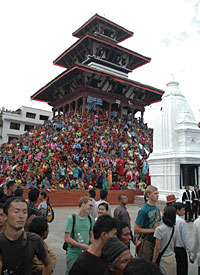 KIRAN PANDAY |
It is getting a bit too much, the attempt by politically correct moral police these days to judge the inclusivity of functions by tallying token representation based on surname or gender.
If they find one surname representing a Dalit, Janajati or marginalised group, they heave a sigh of relief. But I wonder if they are trying to be more inclusive, or more exclusive. Are our intellectuals, analysts, politicians and journalists so mentally constricted that they cannot think beyond their own caste?
To be sure, there are many groups in Nepal that have not been given a say in decision-making. This gross violation of human rights and dignity was perpetrated by Bahuns and Chhetris, and other groups have genuine grievances that have to be addressed. But let's not go to the other extreme by insisting that participation in every function be reckoned by the proportions of caste, ethnicity, religion, language, gender and so on.
What is going on in the name of redressing past wrongs is aggravating divisions in Nepali society. This has the potential to seriously disturb communal harmony and trigger violence.
Futile donor-driven efforts to make Nepali society just and inclusive are fake, a mere facade. If we consciously involve all castes, creeds and religions in all aspects of life superficially it will look quite inclusive, but it will not solve the deep-rooted problems of marginalisation and poverty in this country. You can already see that reservation is creating a creme de la creme of neo-elites in beneficiary groups. The majority within these groups, however, is still deprived and discriminated against. The neo-elite skims off the benefits, and nothing percolates down to the lower levels.
Pretend inclusivity is seriously abusing the human rights of many in this country. Deprivation crosses caste and ethnic lines. Brahmins and Chhetris together constitute nearly 30 per cent of the population, many of them are not rich, don't have civil service jobs and in parts of the country are actually at the bottom of the economic ladder. If you really want to look at numbers, there are more 'high' caste people living below the poverty line than 'low' caste people.
Now, with affirmative action, even if the children of very poor Brahmin or Chhetri families excel academically and come into the job market, they risk being excluded from government or INGO jobs. So in trying to correct one wrong, you make another mistake. These poor youngsters whose parents have spent their lives in absolute poverty should not be penalised for the misdeeds of those with whom they only share surnames.
Many Nepalis raise issues when there is a possibility of funding. These flavour of the month fashionable causes are having a detrimental effect on the progressive evolution of our society. Interestingly, it is the higher castes themselves who have been championing the cause of the downtrodden by promising to include them.
There is no issue with some European donors being more aggressive in trying to uplift the really marginalised. But inclusivity must look beyond the token presence of people with certain surnames. An empty stomach is an empty stomach, whether it is a Brahmin or a Dalit one.
The state should strive for economic and social balance, remove inequities and give everyone equal opportunities. But if it really wants to do poor people a favour, it has to be on an economic basis, not on the basis of caste. This country will progress only if we adopt meritocracy in all walks of life. If not, we will be forever stuck in a politically correct morass. No NGO or activist is thinking about this potentially divisive issue because there are no donor funds earmarked for it.
Normally, following a successful revolution, people and society are eager to embrace new ideas and changes. But even if they feel such changes will have a negative impact on society, many will prefer to keep mum so as not to be labelled anti-national, counter-revolutionary or status-quoist.
This could be the reason otherwise sane, rational critical thinkers are keeping quiet about token inclusivity.
Prateek Pradhan is the editor of Karobar, a new Nepali language business weekly.
READ ALSO:
Meanwhile, the economy..? - FROM ISSUE #481 (18 DEC 2009 - 24 DEC 2009)
The golden middle?- FROM ISSUE #481 (18 DEC 2009 - 24 DEC 2009)
"Find the correct pace for both sides" - FROM ISSUE #480 (11 DEC 2009 - 17 DEC 2009)



